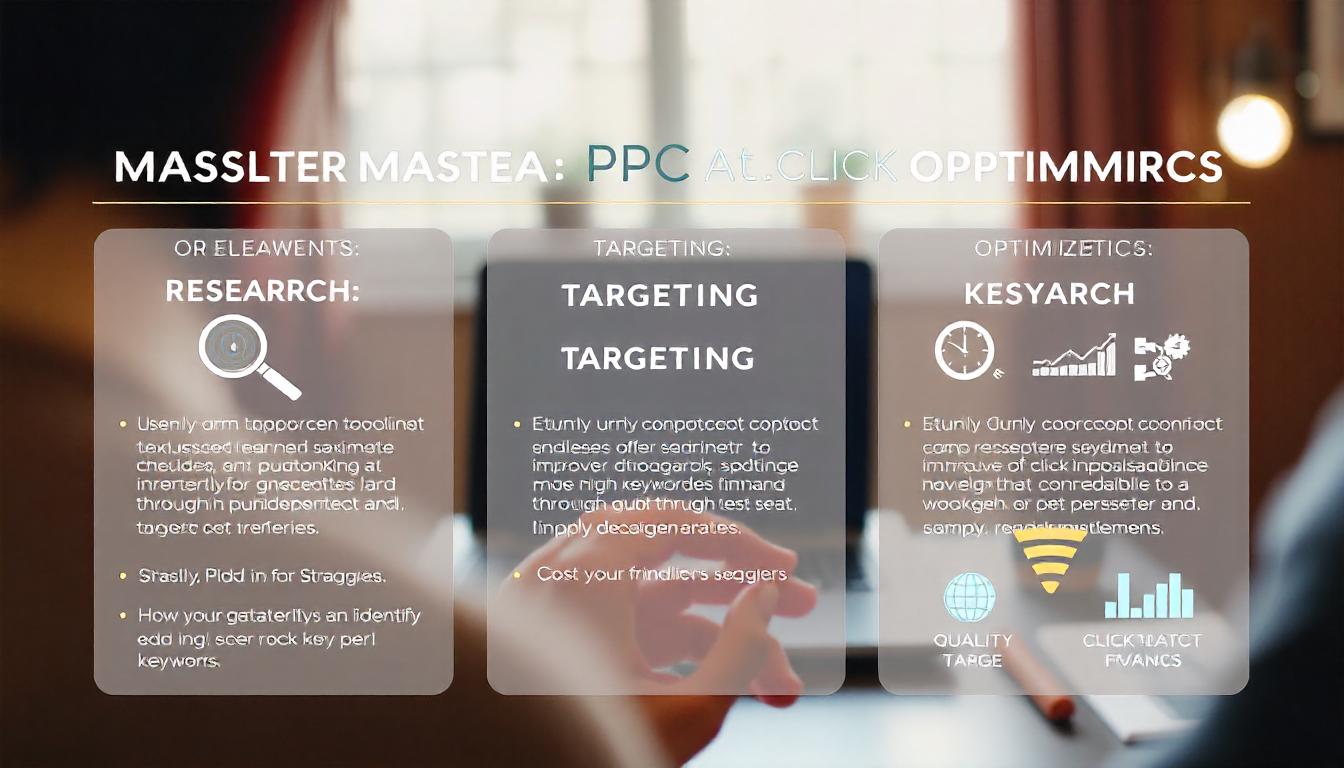Mastering PPC Keywords: Research, Targeting, and Optimization Strategies

Mastering PPC Keywords: Research, Targeting, and Optimization Strategies
Pay-per-click (PPC) advertising relies heavily on effective keyword strategies. Understanding how to research, target, and optimize your PPC keywords can significantly improve your campaign's success. In this guide, we'll explore essential methods for selecting the right keywords and making the most out of your ad budget.
Table Of Content
- Mastering Keyword Research: Finding the Right Terms for Your PPC Strategy
- Essential Tools for Effective Keyword Research
- Optimizing Keyword Strategy: Effective Competitor Analysis for PPC Campaigns
- Advanced Strategies for Effective Keyword Research
- Unlocking the Potential of Long-Tail Keywords in PPC Campaigns
- How to Maximize PPC Results with Negative Keywords
- Optimizing Your PPC Ad Group Structure for Maximum Impact
- Optimizing Keyword Match Types in PPC Campaigns for Maximum Impact
- Optimizing Bidding Strategies for Higher ROI
- Optimizing PPC Ad Copy for Higher Click-Through Rates
- Crafting Compelling Ad Copy: Key Tips for Boosting Click-Through Rates
Mastering Keyword Research: Finding the Right Terms for Your PPC Strategy
Before launching your PPC campaigns, identifying relevant keywords is essential. Keywords serve as the foundation of your PPC strategy, and the right choices can significantly impact your campaign's success. Start by creating a list of terms connected to your products or services. Think like your customers: what would they search for to find what you offer?
Utilize keyword research tools such as Google Keyword Planner, SEMrush, or Ahrefs to broaden your list and uncover new opportunities. These tools provide insights into search volume, competition levels, and potential costs per click. Analyze this data to prioritize high-performing keywords that align with your business goals and target audience.
Your aim is to find not just popular keywords, but terms that attract qualified leads to your website. Look for keywords that balance search volume and competitiveness, ensuring they are specific enough to reach your ideal customers effectively.
| Keyword Research Tool | Key Features | Benefits |
|---|---|---|
| Google Keyword Planner | Search volume, CPC estimates | Free, integrated with Google Ads |
| Improved Performance | Faster loading times due to optimized frontend delivery. | Target audiences with clear intent, often ready to buy. |
| SEMrush | Competitor analysis, keyword suggestions | Comprehensive insights, user-friendly |
| Ahrefs | Backlink analysis, SERP analysis | In-depth keyword data, extensive database |
By focusing on these aspects, you'll develop a strong keyword strategy that drives traffic and boosts your PPC campaign's effectiveness. Remember, past missteps in keyword selection can be improved upon with thorough research and a structured approach.
Essential Tools for Effective Keyword Research
When it comes to keyword research, using the right tools can make all the difference. Tools for keyword research like Google Keyword Planner, SEMrush, and Moz Keyword Explorer help you uncover valuable insights. They provide keyword suggestions, search volume trends, and competitive analysis that refine your keyword strategy and enhance your SEO ranking.
Additionally, platforms such as SpyFu and KeywordSpy allow you to analyze your competitors' keywords. By understanding their strategies, you can identify new opportunities and optimize your own campaigns. This approach not only improves your PPC landscape but also helps you stay competitive.
To create a solid keyword list, combine these tools with your insights. Regularly monitor and adjust your keyword strategy based on performance data. This practice is crucial for optimizing your PPC campaigns and maximizing your return on investment (ROI).
Keyword Research Tools Comparison
| Tool | Features | Best For |
|---|---|---|
| Google Keyword Planner | Keyword suggestions, search volume | Beginners and basic research |
| SEMrush | Competitive analysis, keyword tracking | In-depth SEO and PPC analysis |
| Moz Keyword Explorer | Keyword suggestions, SERP analysis | Comprehensive research |
| SpyFu | Competitor keyword analysis | PPC insights |
| KeywordSpy | Competitive keyword tracking | Analyzing competitors' tactics |
By leveraging these tools effectively, you can significantly enhance your keyword research process.
Optimizing Keyword Strategy: Effective Competitor Analysis for PPC Campaigns
Understanding and analyzing competitor keywords is key for sharpening your PPC strategy. This process involves examining which keywords your competitors target, how they structure their campaigns, and where you can find opportunities to set yourself apart. By looking into competitors’ keyword choices, ad copy, and budget allocations, you can pinpoint areas where you could potentially outrank them.
Key Tools for Competitor Keyword Research
Several tools can streamline competitor keyword research, such as SEMrush, SpyFu, and Ahrefs. These platforms allow you to track competitor keywords, ad spend, and performance metrics like click-through rates. For instance, SpyFu and Ahrefs provide insights into how your competitors balance high-volume short-tail keywords with highly targeted long-tail terms. By reviewing their rankings and ad effectiveness, you can identify top-performing keywords and understand the tactics driving their results.
Analyzing Competitor Ad Copy and Landing Pages
Your competitors’ ad copy and landing page structure reveal a lot about what resonates with your shared audience. Look at their messaging, call-to-action (CTA) styles, and layout choices. Tools like Facebook Ad Library and Google Ads also help identify ad creative and CTA trends. This insight can help you craft a unique, compelling approach that aligns with your brand but incorporates successful elements from competitor campaigns. Consider whether they use simple designs, persuasive language, or specific visuals—then adapt those features to improve your own ads and landing pages.
Competitor Budget Allocation and Ad Placement
Understanding how competitors allocate budgets can give you an edge. Tools like Akkio reveal if your competitors focus heavily on specific platforms (like Google or LinkedIn for B2B) or spread their spend across multiple channels. By tracking these insights, you can adjust your ad placements to optimize for high-engagement platforms. Monitoring fluctuations in competitor budgets can also indicate shifts in seasonal targeting or strategic pivots, allowing you to stay agile.
Developing a Unique Edge
While competitor analysis is essential, it’s equally important to maintain a unique edge in your keyword strategy. Focus on your unique selling points (USPs) and consider adding niche keywords that highlight what sets your business apart. A balanced strategy—leveraging competitive insights without over-relying on them—creates PPC campaigns that are distinctive, engaging, and effective in driving conversions.
Advanced Strategies for Effective Keyword Research
Understanding keyword research basics is a solid start, but to truly optimize your PPC campaigns, advanced strategies are key. Here are targeted techniques that can help refine your approach:
1. Leveraging Long-Tail Keywords for Niche Audiences
Long-tail keywords help target specific audiences with more precise intent, which can boost conversion rates. These phrases are typically three to five words long and less competitive, making them ideal for high-impact, low-cost targeting.
| Long-Tail Keyword Benefits | Details |
|---|---|
| Reduced Competition | Less competition than generic terms, leading to lower costs. |
| Higher Conversion Rates | Target audiences with clear intent, often ready to buy. |
2. Using Negative Keywords to Cut Costs
Adding negative keywords to your campaigns filters out irrelevant traffic, reducing costs and improving ad relevance. For instance, if your product doesn’t include "free," set it as a negative keyword to avoid clicks from users seeking free options.
3. Organizing Keywords with Clustering and Grouping
Grouping keywords by intent or theme—keyword clustering—enhances ad targeting and ensures content aligns with user expectations. This approach also helps organize large keyword lists, making your campaigns more efficient and manageable.
Tip
To enhance your eCommerce store’s performance with Magento, focus on optimizing site speed by utilizing Emmo themes and extensions. These tools are designed for efficiency, ensuring your website loads quickly and provides a smooth user experience. Start leveraging Emmo's powerful solutions today to boost customer satisfaction and drive sales!
Unlocking the Potential of Long-Tail Keywords in PPC Campaigns
Long-tail keywords are powerful tools for crafting more targeted and budget-friendly PPC campaigns. These specific phrases may have lower search volumes, but they can drive higher conversion rates by reaching audiences further along in the purchasing process. Including long-tail keywords in your strategy attracts customers with clearer intent, which often leads to lower competition, more qualified traffic, and improved Quality Scores. This Quality Score boost reduces CPCs, raises ad positions, and maximizes ROI.
To identify effective long-tail keywords, analyze search query reports and use tools like Google Keyword Planner or SEMrush. This approach not only drives conversions but also positions your ads for voice search optimization. With the increasing use of voice-activated devices, targeting long-tail keywords allows you to engage users naturally, mirroring the conversational style of voice searches.
| Benefits of Long-Tail Keywords | Impact on PPC Campaigns |
|---|---|
| Higher Conversion Rates | Targets high-intent users |
| Lower Competition | Increases ad visibility |
| Improved Quality Score | Lowers CPCs, boosts ROI |
| Voice Search Optimization | Connects with voice users |
By refining your PPC strategy with long-tail keywords, you align your campaigns with user behavior and keep pace with voice search trends. This targeted approach can improve campaign performance while keeping costs manageable.
How to Maximize PPC Results with Negative Keywords
Negative keywords are essential for refining PPC campaigns, increasing CTR, and reducing unnecessary costs. By filtering out irrelevant traffic, negative keywords help ensure your ad budget goes toward high-potential prospects who are more likely to convert.
Start by analyzing search terms that trigger your ads, identifying any irrelevant terms, and building a focused list of negative keywords to exclude. Use various match types—broad, phrase, and exact—to fine-tune this list and further control where your ads appear. Regularly updating your negative keywords is key to maintaining relevancy, improving CTR, and boosting overall campaign performance.
Here’s a simple table showing the benefits of each negative keyword match type:
| Match Type | Benefits | Use Cases |
|---|---|---|
| Broad | Excludes a wide range of irrelevant terms | Use to eliminate broad, irrelevant terms |
| Phrase | Blocks specific phrases | Prevents ads from showing for unwanted phrases containing the negative keyword |
| Exact | Excludes only exact terms | Ideal for highly specific terms that consistently attract irrelevant traffic |
Advanced tools, like Negative Keyword Pro, can automate and streamline this process. These tools analyze search terms and suggest negative keywords based on performance data, helping you manage negative keywords with less effort. By leveraging automation, you can keep your campaigns efficient, saving time while improving ad relevancy and CTR.
Optimizing Your PPC Ad Group Structure for Maximum Impact
Organizing ad groups effectively can drive strong PPC results. A focused ad group structure—centered around specific keywords and themes—makes your ads more relevant to search intent. When each ad group contains closely related keywords, you improve both click-through rates and quality scores, which can lower ad costs and secure better placements.
Key Elements of a Strong Ad Group Structure
| Aspect | Recommendation |
|---|---|
| Keyword Relevance | Use specific, related keywords within each ad group. |
| Targeted Ad Copy | Align ad copy closely with each group’s search intent. |
| Quality Score | Improve scores by keeping ad content highly relevant. |
| Conversion Focus | Aim for relevancy to increase clicks and conversions. |
Additional Tips
- Regular Audits: Reassess keywords periodically to refine relevance and ad performance.
- Avoid Common Mistakes: Past errors often include loosely themed ad groups. Avoid this by grouping keywords carefully to ensure each ad group has a distinct, focused theme. This method enhances ad effectiveness and ensures a stronger return on investment (ROI) for your PPC campaigns.
Optimizing Keyword Match Types in PPC Campaigns for Maximum Impact
When fine-tuning your PPC campaigns, using the right keyword match types can make a significant difference in both cost efficiency and targeting. Each match type—broad, phrase, exact, and negative—offers unique advantages and plays a role in reaching the most relevant audience.
Broad Match: Broad match captures the widest range of search intent by including close synonyms, related terms, and even loosely associated phrases. This option can drive high impressions, but it often requires careful monitoring to avoid budget drain from irrelevant clicks. Broad match works best when paired with negative keywords to exclude unqualified searches and enhance relevancy.
Phrase Match: With phrase match, ads appear when user queries include the specified keyword phrase in the correct order, though other words may appear before or after. This option is effective for capturing mid-range relevancy—especially useful if you want a balance between high reach and better control over ad displays.
Exact Match: Exact match restricts ad display to searches that closely match your specified keywords, including close variants like plurals or misspellings. Although traffic volume may be lower, it yields high-quality clicks, as users searching these terms are likely interested in specific products or services. Exact match is ideal when your budget is limited and each click's quality matters.
Negative Match: Negative keywords are essential to block ads from appearing in irrelevant searches. You can set negative keywords at broad, phrase, or exact levels to filter out low-converting clicks, keeping your budget focused on searches that are more likely to convert.
Best Practices for Keyword Match Optimization
- Mix and Monitor: Use a combination of match types for flexibility. For example, start with broad and phrase matches to explore potential new keywords, then refine with exact matches based on performance data.
- Add Negative Keywords Regularly: Use search term reports to identify and exclude irrelevant queries. Adding negative keywords continuously helps prevent your budget from being wasted on irrelevant searches.
- Analyze Performance by Match Type: Review match-type performance data to see which match types lead to higher conversion rates and adjust accordingly. For instance, if exact match terms convert better, consider expanding your exact match list.
- Tailor Bids by Match Type: Allocate higher bids to exact match terms for higher-quality traffic while keeping broad match bids conservative to control spending.
Optimizing Bidding Strategies for Higher ROI
Maximizing your ROI in PPC campaigns hinges on using the right bidding strategies. Start by aligning your bids with specific campaign goals, like driving clicks, boosting conversions, or sticking to a defined budget. Using a combination of manual and automated bidding lets you respond effectively to market shifts and competitor behavior. This approach gives you greater control over top-performing keywords and allows you to allocate more budget to those that generate higher traffic and conversions. Adjusting bids in real time based on performance metrics can ensure your campaigns stay on target and adapt to changes.
Key Components of a Strategic Bidding Approach
| Component | Description |
|---|---|
| Bid Adjustments | Use modifiers for device, location, or time to reach specific audience segments effectively. |
| Manual Bidding | Offers precise control for specific keywords and tighter budget management. |
| Automated Bidding | Useful for scaling campaigns while keeping efficiency high through machine-driven adjustments. |
| Performance Tracking | Regularly monitor and refine bids based on analytics to improve ROI. |
Choosing the Right Bidding Strategy
Testing various strategies, from manual to automated bidding, helps find what works best. Manual bidding can provide granular control, while automated bidding can enhance efficiency and adjust in real time. This iterative approach is key—analyze, adjust, and optimize continually. By doing so, you’ll increase your ROI and build a sustainable, growth-oriented PPC strategy.
Optimizing PPC Ad Copy for Higher Click-Through Rates
Optimizing ad copy with the right keywords can significantly boost your click-through rate (CTR) in PPC campaigns. After identifying relevant, high-impact keywords, focus on incorporating them directly into your ad copy to match user search intent and improve ad visibility. Clear, concise headlines play a vital role in engaging potential customers and guiding them to click.
For effective headlines, use actionable language that resonates with the search query and emphasizes the unique value of your offer. Try words like “exclusive,” “limited-time offer,” or “free”—these create urgency and appeal to users. Make sure headlines are easy to understand and aligned with your product or service’s main benefits.
To continually improve your ad copy, use A/B testing. Test different headline versions and analyze which ones deliver higher click-through and conversion rates. By reviewing performance data, you can refine your approach, creating ad variations that better connect with your target audience.
| Ad Optimization Tips | Details |
|---|---|
| Keyword Relevance | Integrate high-performing keywords into ad headlines and descriptions. |
| Clear Value Proposition | Clearly convey the unique benefits of your product or service. |
| Use of Power Words | Words like “exclusive,” “limited-time” encourage clicks. |
| A/B Testing | Test and refine to find the most effective headlines. |
Continually improving ad performance is crucial. Prioritizing keyword relevance and testing headline variations can directly impact your PPC campaign’s success.
Crafting Compelling Ad Copy: Key Tips for Boosting Click-Through Rates
In digital advertising, your ad description carries significant weight. It's where you expand on your value proposition, engage with potential customers, and prompt action. An effective ad description should be clear, specific, and speak directly to the needs of your audience. By addressing key pain points and emphasizing benefits, your ad becomes a compelling solution for your viewers.
Use active, straightforward language that’s easy to understand. Avoid jargon or overly complex terms. Here’s a practical approach:
- Address Pain Points Directly: Outline how your product or service solves common problems. Instead of vague promises, be specific about what sets your solution apart.
- Incorporate Keywords: Integrate focus keywords like “ad description,” “ad relevance,” and “click-through rates (CTR)” naturally. This boosts your ad’s relevance and can improve your Quality Score, making it more visible to the right audience.
- Highlight Unique Selling Points (USPs): Include any distinctive benefits, such as free trials, flexible pricing, or fast delivery. Promotions and offers can also differentiate your ad and make it more attractive to potential buyers.
- Add a Clear Call-to-Action (CTA): Guide users toward their next step with a concise, action-focused CTA. Phrases like “Get Started,” “Explore Now,” or “See How it Works” can increase the likelihood of engagement.
| Key Element | Example |
|---|---|
| Pain Points Addressed | “Struggling with slow delivery? Try our same-day shipping.” |
| Keywords Integrated | “Boost your click-through rates with compelling ad copy.” |
| Unique Selling Points | “Enjoy a free trial – no strings attached!” |
| Call-to-Action (CTA) | “Start your journey today!” |
Errors in ad descriptions—like unclear CTAs or unverified claims—can weaken user trust. Avoid them by being precise, ensuring your information is accurate, and continuously improving based on performance data.
FAQs
What Are PPC Keywords, and Why Are They Important?
PPC keywords are terms and phrases that advertisers bid on to show their ads in search engine results. Choosing the right keywords is crucial, as they directly impact the visibility, relevance, and cost-effectiveness of PPC campaigns.
How Can I Effectively Research PPC Keywords?
Researching PPC keywords involves analyzing terms your target audience is likely to search. Utilize tools like Google Keyword Planner, SEMrush, or Ahrefs to identify relevant keywords based on search volume, competition, and relevance to your product or service.
What’s the Role of Long-Tail Keywords in PPC Campaigns?
Long-tail keywords are specific, often lower-volume search phrases that tend to have less competition and a higher conversion rate. Targeting these keywords allows for more precise audience targeting and often leads to lower CPCs and better ROI.
How Do I Identify Negative Keywords for My Campaign?
Negative keywords are terms you don’t want your ads to appear for, helping prevent irrelevant clicks. Identify these by analyzing search query reports and excluding terms that don’t align with your campaign goals.
Why Is Keyword Clustering Useful in PPC Strategy?
Keyword clustering groups similar keywords, making it easier to tailor ads and landing pages to specific search intents. This approach can improve Quality Score and CTR by ensuring that ads are highly relevant to user queries.
What Tools Can Help with PPC Keyword Research?
Tools like Google Ads Keyword Planner, Moz, and Ubersuggest provide insights into keyword performance, helping you identify valuable keywords. These tools analyze metrics like search volume, competition, and trends to guide your PPC strategy.
How Can I Optimize PPC Keywords for Better ROI?
To optimize PPC keywords, regularly review and adjust bids based on performance data, refine ad copy for relevance, and use A/B testing to see what works best. Focus on improving Quality Score, which can lead to lower CPCs and higher ad placements.
What Are Some Advanced Keyword Research Techniques for PPC?
Advanced techniques include using keyword gap analysis to find opportunities, applying seasonal trends, and leveraging AI tools for predictive insights. These methods help discover unique keywords that can set your campaigns apart.
Where Can I Learn More About PPC Keyword Research and Strategy?
Explore resources such as Google Keyword Planner and Moz’s Guide to PPC for detailed strategies on keyword research, targeting, and optimization.









